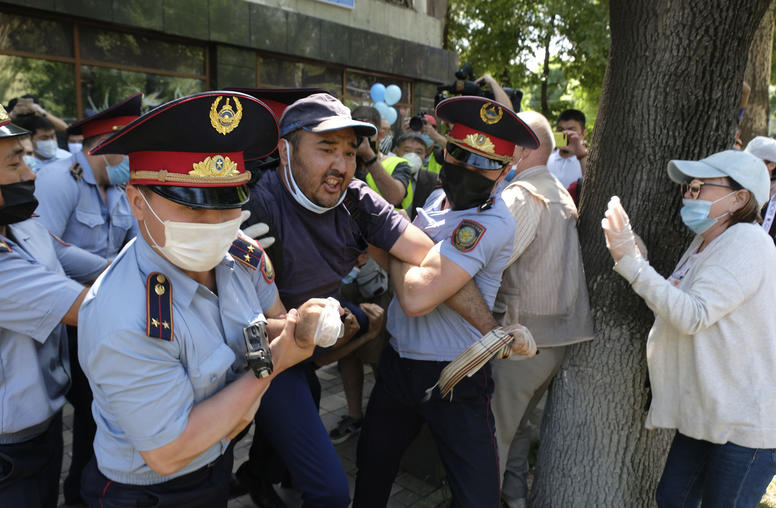Question And Answer
Publications
Articles, publications, books, tools and multimedia features from the U.S. Institute of Peace provide the latest news, analysis, research findings, practitioner guides and reports, all related to the conflict zones and issues that are at the center of the Institute’s work to prevent and reduce violent conflict.

Looking for Trouble: Sources of Violent Conflict in Central Asia
This report offers a road map for understanding the most likely sources of violent conflict in the post-Soviet nations of Central Asia—ethno-nationalism and nativism, Islam and secularism, water resources and climate change, and labor migration and economic conflict. The analysis draws from emerging trends in the region and identifies the ways in which Central Asia’s geography and cultural place in the world interact with those trends. It suggests that the policy goals of the United States, Russia, and China in the region may be more compatible than is often assumed.

Susan Stigant on Ethiopia’s Escalating Civil Conflict
As rising violence in Ethiopia threatens to pull neighboring Eritrea into the fray, USIP’s Susan Stigant says, “There is a real need for some external, independent investigator to help diffuse some of that escalation” and look into disturbing reports of human rights violations stemming from the conflict.

The Unfolding Conflict in Ethiopia
Susan Stigant, director of Africa Programs at the U.S. Institute of Peace, testified on December 3, 2020 at the House Foreign Affairs Subcommittee on Africa, Global Health, Global Human Rights and International Organization's hearing on “The Unfolding Conflict in Ethiopia.” Her expert testimony as prepared is presented below.

Scott Smith on U.S. Troop Withdrawal from Afghanistan
With news of a breakthrough in Afghan peace talks, USIP’s Scott Smith warns that future troop withdrawal should “switch from a time-based deadline approach to a conditions-based approach” because if the Taliban believe withdrawal is inevitable, “they have no incentive to compromise.”

China’s Influence on Conflict Dynamics in South Asia
China has embarked on a grand journey west. Officials in Beijing are driven by aspirations of leadership across their home continent of Asia, feelings of being hemmed in on their eastern flank by U.S. alliances, and their perception that opportunities await across Eurasia and the Indian Ocean. Along the way, their first stop is South Asia, which this report defines as comprising eight countries—Afghanistan, Bangladesh, Bhutan, India, Maldives, Nepal, Pakistan, and Sri Lanka—along with the Indian Ocean (particularly the eastern portions but with implications for its entirety). China’s ties to the region are...

Jacob Stokes on China’s Influence in South Asia
Home to about 2 billion people, South Asia has become a strategic focal point for China’s growing global influence. USIP’s Jacob Stokes says to properly counterbalance Beijing in the region, the United States should focus “less about responding to China … and more engaging with the states of South Asia.”

Mona Yacoubian on Lebanon’s Dangerous Meltdown
As Lebanon teeters on the edge of total state collapse, USIP’s Mona Yacoubian says very little stands in the way of malign actors and possibly a new migrant crisis in the region: “The lights are truly blinking red … if the army collapses, then, honestly, I think all bets are off.”

Priscilla Clapp on the Violent Fallout from Myanmar’s Coup
Myanmar’s military expected to reclaim control quickly after February’s coup. But USIP’s Priscilla Clapp says that “when the civilian protests persisted beyond a month, the military began to panic … As a result, the country has descended into chaos and widespread indiscriminate violence.”

People to People: Examining Grassroots Peacebuilding Efforts Between Israelis and Palestinians
Lucy Kurtzer-Ellenbogen, director of the Israeli-Palestinian conflict program, testified on July 21, 2021 at the House Foreign Affairs Subcommittee on the Middle East, North Africa, and Global Counterterrorism's hearing on "People to People: Examining Grassroots Peacebuilding Efforts Between Israelis and Palestinians." Her expert testimony as prepared is presented below.

Joseph Sany on the Turmoil in Ethiopia and China’s Role in Africa
As China steps up its engagement in Africa amid lagging vaccination rates and tensions in Ethiopia, USIP’s Joseph Sany says U.S. policy must avoid a narrow, competitive mindset: “[China] is doing what a major superpower does … [the United States] must address African interests, not impose American interests.”